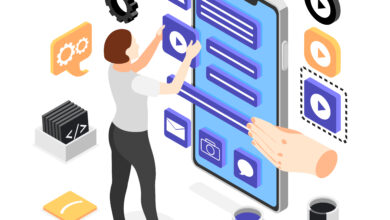How Fintech Mobile Apps are Revolutionizing Digital Transformation in the Banking Sector

The banking sector is undergoing a significant transformation, driven by rapid technological advancements and evolving customer expectations. At the heart of this change is the integration of fintech mobile apps, which play a pivotal role in the digital transformation of banking. As financial institutions seek to stay relevant in a highly competitive landscape, the adoption of fintech mobile app development services has become critical. This article explores how fintech mobile apps are driving digital transformation in banking, transforming customer experiences, and reshaping traditional banking operations.
1. The Need for Digital Transformation in Banking
The rise of digital technologies has fundamentally altered how businesses operate, and banking is no exception. Traditional banking methods, which relied heavily on physical branches and face-to-face interactions, are rapidly being replaced by digital channels. Digital transformation in banking is more than just adopting new technologies; it involves rethinking business models, embracing innovation, and delivering superior customer experiences.
Customers now expect quick, seamless, and personalized services, which traditional banking methods often struggle to provide. The need for convenience, coupled with the growth of mobile technology, has led to the increased adoption of fintech mobile apps, making it essential for banks to invest in fintech mobile app development services to keep up with the competition.
2. The Role of Fintech Mobile Apps in Digital Transformation
Fintech mobile apps have become a game-changer in the financial services industry, enabling banks to meet the demands of the modern digital age. These apps not only offer users the convenience of accessing banking services from their mobile devices but also provide a range of advanced features that enhance the overall banking experience.
2.1. Enhancing Customer Experiences
One of the primary ways fintech mobile app development services contribute to digital transformation in banking is by improving customer experiences. Mobile banking apps allow users to perform various financial activities such as checking account balances, transferring money, paying bills, and applying for loans, all from the comfort of their smartphones. The integration of personalized financial insights, AI-driven chatbots, and voice assistants adds to the convenience, making banking more accessible and user-friendly.
By offering seamless digital services, banks can increase customer satisfaction and retention, which is crucial in a market where customers can easily switch to a competitor if they find the services inadequate.
2.2. Enabling Real-Time Payments and Transactions
The ability to conduct real-time transactions is another significant benefit of fintech mobile apps. With the help of fintech mobile app development services, banks can offer instant payment solutions, digital wallets, and peer-to-peer transfer options that simplify money transfers. Real-time payments provide greater transparency and efficiency, which are essential for both individual and corporate banking needs.
Furthermore, digital payment solutions offered through fintech apps enable banks to reach unbanked and underbanked populations, driving financial inclusion and expanding their customer base.
2.3. Automating Banking Processes
Automation is a key component of digital transformation in banking. Fintech mobile apps allow banks to automate various processes such as loan approval, customer onboarding, and fraud detection. By leveraging artificial intelligence (AI) and machine learning (ML), these apps can analyze large datasets to identify patterns, make predictions, and streamline workflows.
The automation of routine tasks not only reduces operational costs but also minimizes human errors, leading to better risk management and compliance. Banks that utilize fintech mobile app development services for automation can significantly improve their operational efficiency and offer more reliable services.
3. Key Features of Fintech Mobile Apps Driving Digital Transformation
When it comes to fintech mobile app development services, certain features are essential for driving digital transformation in banking. These features include:
3.1. Advanced Security Measures
Security is a top concern in the financial services industry, and fintech mobile apps incorporate advanced security measures such as multi-factor authentication, biometric verification, and encryption to protect user data. These measures ensure that customers can perform financial transactions with confidence, making the adoption of digital banking solutions more widespread.
3.2. AI-Driven Personalization
AI-driven personalization allows fintech apps to deliver customized experiences to users. By analyzing user behavior and financial data, these apps can provide personalized financial advice, recommend products, and predict user needs. This level of personalization enhances customer satisfaction and encourages the adoption of digital banking services.
3.3. Integration with Other Financial Services
The ability to integrate with other financial services, such as stock trading, insurance, and digital wallets, allows fintech mobile apps to offer a comprehensive financial management solution. This integration is a critical component of digital transformation in banking, as it enables users to manage all their financial needs in one place.
3.4. Real-Time Notifications and Alerts
Fintech mobile apps provide real-time notifications and alerts, keeping users informed about their account activities, due payments, and suspicious transactions. This feature not only enhances security but also helps customers stay on top of their finances, leading to better financial management.
4. The Benefits of Adopting Fintech Mobile App Development Services
The adoption of fintech mobile app development services offers numerous benefits to banks and financial institutions, including:
4.1. Cost Reduction
Digital banking solutions significantly reduce operational costs by minimizing the need for physical branches and paper-based processes. Automation of routine tasks also reduces staffing costs, allowing banks to allocate resources more efficiently.
4.2. Increased Revenue Streams
Fintech mobile apps provide banks with new revenue opportunities through premium services, personalized financial products, and digital payment solutions. For instance, digital lending services can generate income through interest rates, while personalized investment products can drive higher customer engagement.
4.3. Greater Market Reach
The adoption of fintech apps enables banks to extend their services to customers who may not have access to traditional banking channels. This expansion helps banks tap into new markets and increase their customer base, thereby driving growth.
4.4. Enhanced Customer Loyalty
By providing a seamless and personalized banking experience, fintech mobile apps help banks build stronger relationships with their customers. The convenience of mobile banking increases user satisfaction and encourages customers to remain loyal to the bank.
5. Challenges in Implementing Digital Transformation in Banking with Fintech Mobile Apps
While digital transformation in banking has numerous benefits, it also comes with certain challenges, including:
5.1. Regulatory Compliance
The financial services industry is heavily regulated, and banks must ensure that their digital solutions comply with all relevant laws and regulations. This can be challenging when implementing new technologies and features, especially in different regions with varying regulations.
5.2. Cybersecurity Threats
As digital banking solutions grow, so do the risks associated with cyberattacks. Banks must invest in robust cybersecurity measures to protect user data and prevent fraud. Partnering with experienced fintech mobile app development services can help mitigate these risks by incorporating advanced security features.
5.3. Resistance to Change
Some traditional banks may face resistance to adopting new digital solutions due to cultural or organizational inertia. Overcoming this resistance requires a strong commitment from leadership and a strategic approach to change management.
6. The Future of Digital Transformation in Banking Through Fintech Mobile Apps
The future of digital transformation in banking is closely linked to the continued development of fintech mobile apps. Emerging technologies such as blockchain, AI, and open banking will play a significant role in shaping the next phase of digital transformation.
- Blockchain Technology: Offers greater transparency and security for financial transactions, making it a valuable addition to mobile banking apps.
- Artificial Intelligence and Machine Learning: Will continue to drive automation, risk management, and customer personalization.
- Open Banking: Allows third-party developers to build innovative financial services, providing users with more choices and enhancing competition in the banking sector.
Banks that leverage fintech mobile app development services and embrace these emerging technologies will be better positioned to thrive in the digital era.
Conclusion
Fintech mobile apps are at the forefront of digital transformation in banking, enabling financial institutions to offer innovative and customer-centric solutions. By adopting fintech mobile app development services, banks can not only enhance customer experiences but also streamline operations and reduce costs. However, navigating the complexities of digital transformation requires careful planning, a commitment to innovation, and a strategic approach to technology adoption.
As the banking sector continues to evolve, embracing fintech mobile app development will be key to staying competitive and meeting the demands of the modern digital landscape.





